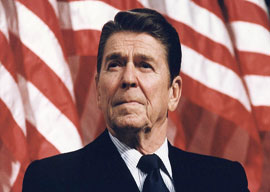
December 10, 2013

President Ronald Reagan
The greatest forces for equal opportunity, higher wages and better working conditions in South Africa, said Reagan, are the U.S., British, French, Dutch and German businesses. Sanctions will force them to divest, depart and sell out to Afrikaners at fire-sale prices.
How does this help the black majority?
Calling capitalism “the natural enemy of such feudal institutions as apartheid,” Reagan noted it was not in the Great Depression but in the prosperity of the 1960s that segregation collapsed in the USA.
While decrying the Pretoria regime’s repression, Reagan also attacked “the calculated terror by elements of the African National Congress—the mining of roads, the bombing of public places” and the “most common method of terror … the so-called necklace.
“In this barbaric way of reprisal, a tire is filled with kerosene and gasoline, placed around the neck of an alleged collaborator and ignited. The victim may be a black policeman, a teacher, a soldier, a civil servant—it makes no difference, the atrocity is designed to terrorize blacks into ending all racial cooperation and to polarize South Africa as a prelude to a final climactic struggle for power.”
In his speech Reagan called specifically for Nelson Mandela’s release, and the release of all political prisoners.
Not for four years would Mandela be let go. But when he was, he, like Reagan, recognized that just as Xhosa and Zulu built South Africa, so, too, had 5 million Boers and Brits. And peace between them—reconciliation, not reprisals, not revenge—was essential if the promise of the country was to be realized.
Undeniably, the American right was suspicious of Mandela and an ANC that condoned and practiced terrorism in the struggle for power, and aligned with enemies like Moammar Gadhafi and Fidel Castro.
Yet, in the last analysis, Ian Smith, the World War II Spitfire pilot and last ruler of Rhodesia, got it right:
“I was right about Mugabe, but wrong about Mandela.”
As for Reagan’s veto, issued in the face of a certain override during a major epidemic of moral posturing, it was both courageous and correct. No regrets needed.